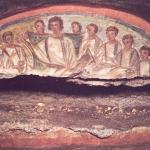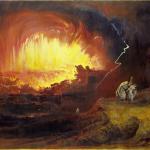Abba John said, ‘Our Father, Abba Anthony, said he had never put his own personal advantage before the good of a brother.’ [1]
St. Anthony the Great learned that the Christian vocation, especially for an ascetic like himself, is aimed not for the sake of the selfish betterment at the expense of all others but for the sake of the common good. Love for God is revealed in love for one’s neighbor. True love seeks for the well-being of the beloved while never thinking about what one gets out of it for oneself, though of course, those who love the most will paradoxically gain more for themselves than those who selfishly look after one’s own affairs without such loving concern. The one who give of themselves the most find themselves entirely empty of all preconditions and preconceptions and will be ready to receive whatever blessings come their way.
This is not to deny Anthony had his own personal tastes and desires. It should be clear, upon reading his biography from Athanasius, Anthony sought after and desired solitude. It gave him a sense of peace which allowed him to engage God better. Whenever people would come around him, seeking after him as a holy man filled with wisdom, turning him into something he felt he was not, he would retreat further into the desert. As he did so, he met with and helped more and more people; he helped others learn the basics of ascetic discipline, training them in what is expected if they wanted to be like him in the desert. He welcomed people who came to him with hospitality, putting them and their needs above his own so that his personal discipline did not overrule his engagement with others. He helped hide St. Athanasius from authorities, which is how and why St. Athanasius came to know him and write his spiritual biography. Likewise, when crises confronted the church and he thought there was something he could do, he would act instead of staying put in his ascetic peace. He was known to help those in prisons when Christians were being rounded up, tortured, and killed; he went to Alexandria to speak against Arius when he saw the Arian confusion causing great strife in the church. He never lost sight of the fact that his personal gain was not just for himself, but for others; he came to know himself, his abilities, his gifts, and he used them for the sake of the church and found his holiness itself, and the grace which he received, was maintained as a result.
Anthony knew that we are to be our brother’s keeper, and in doing so, we help ourselves:
For this cause, therefore, he who sins against his neighbour sins against himself, and he who does evil to his neighbour does evil to himself; and he who does good to his neighbour, does good to himself. Otherwise, who is able to do ill to God, or who is there who could hurt Him, or who could refresh Him, or who could ever serve Him, or who could ever bless Him, that He should need his blessing, who is able to honour Him with the honour that is His due, or to exalt Him as He deserves? Therefore, while we are still clothed in this heavy body, let us rouse up God in ourselves by incitement for each other, and deliver ourselves to death for our souls and for each other; if we do this, we shall be manifesting the substance of His compassion for us. Let us not be lovers of ourselves, so as not to become subject to their inconstant power. For he who knows himself, knows all men.[2]
Anthony taught and explained to others through the wisdom he gained from his own actions. He knew what we do for our neighbor we do for God. If we put ourselves above the good of our neighbor, we put ourselves above God. While we must deny ourselves, it must be done in the right form; it is easy for self-detachment to go astray, leading us to a nihilism which rejects the good found in ourselves. Asceticism, therefore, should seek to help lift us up, to make us better persons so that we can do more for the sake of others. To follow Anthony in this spirit is to stop any and all ways asceticism could lead to the error of quietism, where those who seek meditative peace disengage from their social commitments to others. When we turn inward upon ourselves, explore the inner regions of our being, and come to know ourselves, we must do it in the spirit of detachment and love; quietism seeks lofty contemplation for the sake of self-gain. Quietism mimics and follows that which is holy, but seeks to limit those actions to a few forms of spirituality and meditation; it is self-centered, justifying inaction for the sake of some perceived purity of being. Quietism must not be confused for the retreats and spiritual rest which we all need; there are times we must do nothing but rest.; quietism is the extension of that, taking the good found in this to an extreme, ignoring other goods which are always important for our personal development. Quietism establishes in the soul a self-seeking simulacrum of holiness, imitating an aspect of the ascetic life while ignoring the fullness of the good. Jesus came to give us life; he did not hold himself back, but rather, he did all that he could do for our own good. We, too, must not let ourselves give in to the temptation which would have us seek great spiritual consolation for ourselves while ignoring what we should do once we have them. They refresh us, giving us a sense of peace and well-being which we need, but we must not become like gluttons, seeking them to extreme, beyond our conditioning and level of spiritual preparation. If we do, we will fall into great evil as we pridefully glorify ourselves due to our own limited achievements while, at the same time, become filled with terrible envy at anyone else who has received some good which we do not yet possess. In such a state, charity will grow cold and with it, the holiness which we thought we had will be lost to us until we grow to hate all things, including ourselves, and follow after the devil who seeks to destroy all things because we could not control them through the force of our will.
[Image=Pilgrimage Banner of St. Anthony by Sjouker (Own work) [GFDL (http://www.gnu.org/copyleft/fdl.html) or CC BY-SA 3.0 (https://creativecommons.org/licenses/by-sa/3.0)], via Wikimedia Commons]
[1] The Sayings of the Desert Fathers. trans. Benedicta Ward (Kalamazoo, MI: Cistercian Publications, 1984), 105.
[2] St. Antony, The Letters of St. Antony the Great. trans. Derwas J. Chitty (Fairacres, Oxford: SLG Press, 1991), 20 [Letter VI].
Stay in touch! Like A Little Bit of Nothing on Facebook












